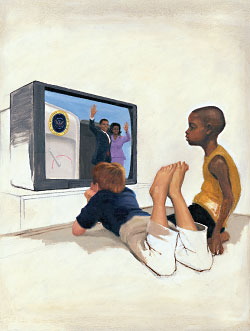
Obama gives a deft, affectionate speech calling on more black men to help raise their kids, and Jesse Jackson muses over removing his gonads. Obama gives a policy speech in Florida and gets shouted down by black-nationalist hecklers waiting for him to put white America’s feet to the fire. We’re going to see more of this between now and November. For all of the excitement in the black community over Obama’s candidacy, certain blacks have no interest in getting past race, and they have decided that if they are going to support Obama, then he better not either.
In fact, to this mind-set, the possibility of America’s having its first black president is a cause for worry as much as jubilation— a distraction from what they see as the implacable institutional racism that permeates American life. Already, various black writers are fretting that an Obama win would lead whites to assume that any black person could be as successful as he with a mere upward pull upon the proverbial bootstraps.
It is easy to suppose that the implications of an Obama presidency for how far we’ve come and how close we are to a post-racial future are mere magazine-cover rhetoric. But if Obama becomes president, there will be a shift in the conception of race in this country that neither side in the culture wars can control. It’s all about youth. Think about it. If Obama is elected to two terms, an entire generation of 10-year-olds will come of age having been barely aware of anyone other than a black man in the White House.
This fall’s college freshmen were born during the first Bush presidency—the invasion of Panama, Dan Quayle, and even “Read my lips” are as distant to them as the Bay of Pigs is to someone born in the early sixties. During Clarence Thomas vs. Anita Hill and the Rodney King trial, they were toddlers.
Imagine what it will be like for people growing up with Barack, Michelle, Sasha, and Malia on their televisions and laptops 24/7 for the next eight years. How likely will they be to maintain the notion that America is a racist country? We learn the language to which we are first exposed. It will be impossible for young people in this new reality to process race in the way we do now. The performances we indulge in over who’s “playing the race card” will seem antique. For the members of a black generation that grew up watching a black man step out of Air Force One, the idea that they live under the yoke of white supremacy would require more cognitive dissonance than most people are willing to tolerate.
Not only would an Obama Generation see a black man occupying the highest office in the land, but its members would be suckled from toddlerhood on a widened conception of black authenticity. The tacit idea that the blackest is the streetest, or that black people in high places inevitably stop being “really black,” will fade. The running joke on a show like 30 Rock that the straitlaced black character (“Toofer”) is less authentic than Tracy Morgan’s black hooligan character will have to be explained to a younger viewer watching reruns in 2020.
All of this is not to say that the black community would miraculously shed its problems the second Obama took office. But Obama Kids would watch a new kind of racial politics in the White House, less about waiting for a second civil-rights revolution and more about helping poor blacks and other minorities within the system as it is. A crucial debate is going on in the black community over whether we need to be talking more about the system or about our own culture (sure, one answer might be “both,” but in reality this usually means talking about the system while occasionally muttering “Culture matters, too”). Obama understands that even if the playing field is not completely level, that’s beside the point if we don’t make sure we know the rules of the game.
And so, as naysayers perched on the barricades call for a dashiki-style crusade against systemic racism, Obama puts forth his common-sense social policies. That is, plans to keep black men out of prison by helping ex-cons settle into mainstream society, or legislation to encourage inner-city fathers to help raise their kids, or an affirmative-action program that aims to help the disadvantaged rather than create a Benetton-ad sense of diversity that makes white people feel good. This is a black president who could take us the final yards to where we need to go, instead of pretending that we have barely gone anywhere. The Obama Generation would grow up with a younger and less grouchy version of Bill Cosby in the White House.
Not long ago, I was a guest on a radio show, calling attention to uplift programs around the country helping poor black people turn their lives around. At one point, a middle-aged black man called in and said, “Are you one of those black conservative types who doesn’t understand white supremacy?” This caller was caught in an ideology that maintains that somehow, for descendants of African slaves in the United States, pessimism and fatalism are progressive. An America that has truly moved past race will be one in which the only black people thinking like that man are elderly.
When I was 3 years old, my grandfather, who was a printer, made a calendar with a photo of me and the words U.S. PRESIDENT, 2010 A.D. Cute, but in 1968, the notion of a black boy on his way to being America’s president was a stretch, to say the least. In 2008, a black man of that very age group may well be on his way to becoming president, and no one quite knows what to make of it. But the Obama Generation will wonder what all the fuss was about.

• Heilemann on the Color-Coded Campaign
• The Racial Politics of the Obama Marriage
• Talking About Not Talking About Race